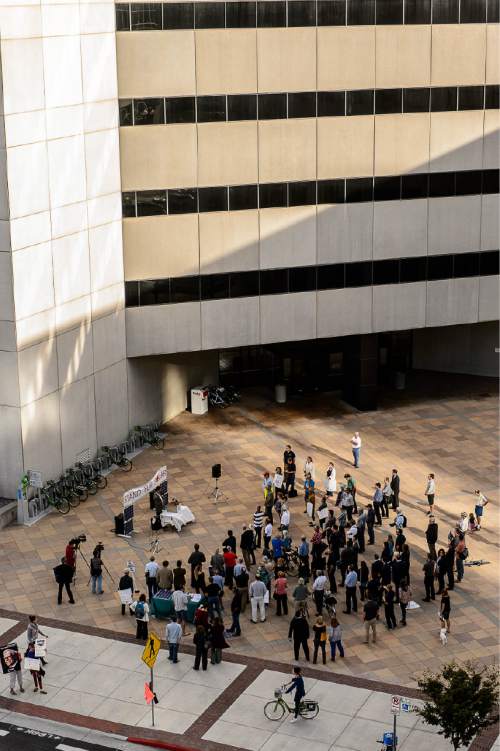This is an archived article that was published on sltrib.com in 2015, and information in the article may be outdated. It is provided only for personal research purposes and may not be reprinted.
Clean-energy advocates are decrying an order issued this week by the Public Service Commission, arguing that it devalues rooftop solar and could enable Utah utilities to increase rates on their net-metered customers.
In the wake of last year's controversial move by Rocky Mountain Power to impose a surcharge, the PSC embarked on a wonkish cost-benefit analysis of rooftop solar.
The PSC on Tuesday adopted a rate-setting framework that tasks Rocky Mountain Power's parent company, PacifiCorp, with comparing the utilities' actual cost of providing service with the cost of service "that would exist but for net metering customers' self-generation."
Critics fear this logic will kick out a crucial financial incentive for investing in solar.
"This ruling excludes some of the most important benefits of solar, including consumer choice, cleaner air and local jobs," said Lindsay Beebe of Sierra Club, which had intervened in this case along with Utah Clean Energy and a solar equipment trade group. "We're concerned that with this most recent, shortsighted ruling, Rocky Mountain Power may once again try to justify its attempts to restrict energy choice and protect its monopoly."
Rocky Mountain Power, Utah's largest electricity provider, applauded the ruling.
"The framework they've adopted will provide a good balance for determining the costs and benefits for both net-metering customers and non-net-metering customers, based on the cost-of-service studies the commission has ordered," said utility spokesman David Eskelsen.
Net-metered homeowners, who are awarded credits for the excess power they pipe into the grid around midday, make up a tiny segment of the utility's customer base.
But dropping costs have made rooftop solar installations increasingly affordable, so the number of RMP's net-metered customers is growing fast, now exceeding 4,000 or about one-half of 1 percent.
The utility has long argued that these customers are not carrying their share of the grid's fixed costs, while reaping the benefits of being able to draw power when the sun is not shining.
The state Division of Public Utilities and Office of Consumer Services largely concurred with RMP. Regulators feared that solar-equipped customers are shifting costs to other residential ratepayers.
During a hearing last month, the three-member PSC heard testimony from numerous witnesses, as well as 33 residents who mostly argued that the commission should do what it can to promote "distributed power generation" from renewable sources.
Its decision came as a shock to Sarah Wright, executive director of Utah Clean Energy, because she says it ignores many benefits solar-equipped homes provide the electrical grid, not to mention the environmental and public health benefits that come with burning less coal and natural gas to generate power.
"We need to look at and understand the tremendous value of private investments in rooftop solar the same way we evaluate and value energy efficiency investments to meet our long-term energy needs in the cheapest way possible," Wright said. "To ignore the fact that private investments in rooftop solar reduces the utilities' long-term costs to serve customers is shortsighted and could stop the growth of rooftop solar in Utah, and the jobs and economic development that it brings to our sunny state."
Advocates like Wright and Stan Holmes argue that rooftop solar reduces the need for RMP to invest in future power generation, yet the PSC has chosen to ignore that long-term benefit and others enjoyed by all ratepayers.
The utility claimed such benefits are speculative and convinced the PSC that it should consider only benefits that can be quantified.
"If they are going to slam solar for not consuming enough [power], are they going to go after people who have put in measures for efficiency?" said Holmes, a net-metered Salt Lake City homeowner and founder of the group known as UCARE.
Lawmakers weighed in last session, passing a bill requiring the PSC to consider the benefits of rooftop solar before authorizing rate changes on net-metered customers.
Solar advocates say the ruling's narrow view of benefits doesn't seem to comply with this legislative mandate, but either way the discussion is far from over.
"In a way it's kicking the can the road," Holmes said. "We are gearing up for the next fight. It is not a tight order. It leaves a lot of open for further contest."
Brian Maffly covers public lands for The Salt Lake Tribune. He can be reached at brianmaffly@gmail.com or 801-257-8713.
Twitter: @brianmaffly —
How electricity rates will be decided under the Public Service Commission's plan
"... When allocating Utah's jurisdictional cost of service to customer classes under the [actual cost of service], PacifiCorp should provide two scenarios for the allocation of costs at the class level: (1) a scenario wherein the class includes net metering customers that are otherwise participants in the class and (2) a scenario wherein the net metering and non-net metering customers are segregated into two new classes and costs are separately allocated based on their respective usage characteristics. Comparing the first scenario with the cost of service allocated to the class under the [counterfactual cost of service] should prove illustrative of the net total and average impact net metering customers bring to the particular class. Whereas comparing the segregated classes will allow the parties and the commission to assess whether non-net metering customers are subsidizing net metering customers under the extant rate structure and to compare the magnitude of any subsidy to the total benefit (or cost) net metering customers bring to the class.
To be clear, the commission is not here concluding that a new rate class should be instituted for net metering customers. However, we believe segregating the customer classes for, at least, these limited analytical purposes will prove instructive in rate setting and is consistent with our duties under the statute."









